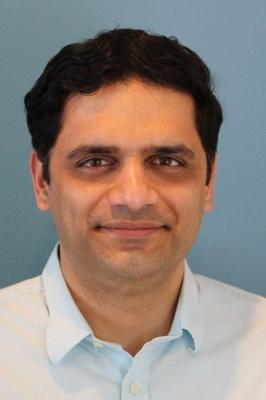
Visvesh S. Sathe received the B.Tech. degree from the Indian Institute of Technology, Bombay and the M.S. and Ph.D. degrees from the University of Michigan, Ann Arbor. He joined Georgia Tech. in 2022, where his group, the Processing Systems Lab (PSyLab) conducts research on a broad range of problems in energy-efficient computing and implantable electronics.
Prior to joining Tech, Visvesh was Associate Professor at the University of Washington (2013-2022), and a Member of Technical Staff in the Low-Power Advanced Development Group at AMD (2007-2013). At AMD, his work involved inventing and translating energy-efficient circuit technologies into next-generation microprocessors. Visvesh led the research and development effort which resulted in the first resonant clocked production processor. While at AMD, he co-developed the adaptive clocking architecture for supply droop mitigation which has been subsequently transferred into volume production. His current research interests are in the exploration of computational techniques for run-time hardware control and optimization of digital and mixed-signal systems over a range of applications. His group’s current research spans clocking, voltage-regulation, power management, baseband processing, ultra-low power electronics, thermal sensing and management, and closed-loop bi-directional neural interfaces.
Visvesh is the recipient of an NSF Career award in 2019 and the Intel outstanding researcher award in 2021. He serves on the technical program committee of the IEEE Custom Integrated Circuits Conference, the Design Automation Conference, the SSCS Webinar committee, and as a distinguished lecturer of the Solid-State Circuits Society.
- Ph.D., Electrical Engineering, University of Michigan, Ann Arbor, 2007
- M.S., Electrical Engineering, University of Michigan, Ann Arbor, 2004
- B.Tech., Electrical Engineering, IIT Bombay, 2001
Professor Sathe’s research focuses on energy efficient computing, spanning efforts in clocking, energy-efficient circuit design, power management, and run-time optimization of integrated systems. His work involves developing these techniques from inception to prototype demonstration, contributing to advancements in computing and communication hardware systems.
Professor Sathe’s teaching emphasizes core electrical and computer engineering principles at undergraduate and graduate levels, including topics related to integrated circuits and computing. His instruction integrates theoretical foundations with practical applications, fostering analytical and problem-solving skills. He actively engages students through collaborative projects and research opportunities to enhance their learning experience and professional development.
- Distinguished Lecturer, Solid-State Circuits Society, 2021-2022 (IEEE)
- Outstanding Researcher Award, 2020, Intel
- CAREER Award, 2019, National Science Foundation (NSF)
- Best paper award, “MATIC: Learning around errors for Efficient Neural Network Accelerators”, ACM/IEEE Design Automation and Test in Europe (DATE)
- Vice-President Spotlight Award for the research, development, and translation of resonant-clocking into volume microprocessor production, April 2012, Advanced Micro Devices
- A. Mandal, D.L. Peña‑Colaiocco, V.R. Pamula, S.I. Perlmutter, F. Pape, …, Computational Vector Stimulation…, IEEE TCAS‑I, 2025.
- C.H. Huang, K.P. Sosa, A. Mandal, J. Arenas, D. Peña‑Colaiocco, V.S. Sathe, Total Energy Minimization…, ESSERC 2025, 285–288, 2025.
- H.S. Öztürk, J. Arenas, C. Tokunaga, N. Kurd, V.S. Sathe, A Compact, Highly‑Digital Sensor‑Fusion‑Based Joint Vdd‑Temperature Sensor…, IEEE JSSC, 2025.
- V.S. Sathe, Power management method, US Patent 12,487,624, 2025.
- C. Li, T.H. Wang, D. Kang, K. Li, X. Zhang, W.E. Lee, V.S. Sathe, S. Li, A 92.1‑dB SNDR… Incremental ADC…, IEEE JSSC, 2025.